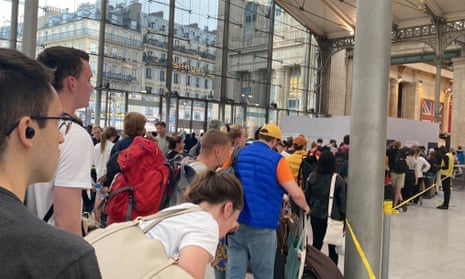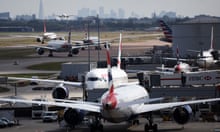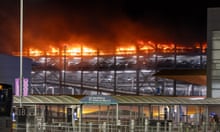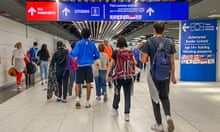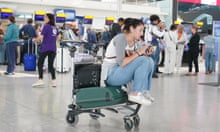UK holidaymakers have faced yet more travel chaos as easyJet cancelled another 80 flights on Sunday, Eurostar trains experienced further delays, and roads began to clog up with drivers returning from half-term and jubilee weekend breaks.
Tens of thousands of British travellers are estimated to be stranded at airports across Europe after close to 200 flight cancellations over the weekend.
As the four-day platinum jubilee weekend came to an end, along with the half-term holiday for most schools in England and Wales, easyJet said it had cancelled about 80 flights “due to the ongoing challenging operating environment”, affecting an estimated 12,000 people.
A handful of British Airways and Wizz Air flights to Gatwick were also cancelled on Sunday and about 3,000 passengers heading for Luton were diverted to other airports after a temporary power failure affected air traffic control systems there.
A problem with the overhead power supply for the Eurostar near Paris led to major delays and cancellations on all its services to and from the French capital and long queues outside the terminus at St Pancras station in central London. Eurostar urged passengers to postpone their journey if it was not essential.

The cross-Channel train service has experienced problems throughout the week, with an IT meltdown and a fatality on the track in northern France causing delayed and cancelled services.
On the roads, many of the 19 million drivers the AA had predicted would get behind the wheel over the four-day weekend began to make their journey home, putting strain on major routes.
In London, the travel woes will continue into the coming week, with 4,000 tube station staff due to walk out for 24 hours on Monday after talks aimed at avoiding a strike collapsed. Londoners have been told to avoid travelling on the tube between Monday morning and 8am on Tuesday.
Sunday’s easyJet cancellations mainly affected Gatwick airport. They come after 25 departures and 22 arrivals from the West Sussex hub were cancelled on Saturday, affecting at least 7,000 passengers.
“We are very sorry and fully understand the disruption this will have caused for our customers,” the airline said. “We are focused on getting them to their destination as soon as possible.” EasyJet said it had extended its customer service opening hours, and was helping those affected find hotel accommodation where required.
Flights from Barcelona, Nice, Madrid, Belfast, Geneva, Corfu, Faro and Glasgow were among those affected.
It caps a disastrous week for UK airports, with the half-term getaway marred by long queues, delayed takeoffs and hundreds of flight cancellations, including more than 180 from holiday firm Tui. Staff shortages, IT issues and poor weather across Europe, leading to air traffic control restrictions, have been blamed.
Airlines and airports are struggling to cope with a surge in demand after all international travel Covid restrictions were scrapped in the UK on 18 March.
Carriers laid off more than 30,000 employees in Britain over the past two years when air travel ground to a halt during lockdowns. Gatwick has 40% fewer directly employed staff than it did before the pandemic, while easyJet has shed 10% of its workers.
Earlier this week, the Ryanair boss, Michael O’Leary, called for military personnel to be brought in to help ease the disruption at airports. Airlines have also asked the government to relax its immigration rules for European citizens to help them hire staff.
However, Grant Shapps, the transport secretary, was dismissive of both suggestions on Sunday. Speaking on BBC’s Sunday Morning programme, he ruled out sending in the armed forces to help process holidaymakers and said more immigration was not the answer. “In fact, in Europe they have got exactly the same problems. If you look at the problems they are having in Amsterdam this weekend, there are problems across Europe.”
Several hubs around the world have also been hit by staff shortages and delays this week, including Dublin, Paris, LA, Toronto and Schiphol airport in Amsterdam. On Saturday the Dutch national carrier KLM cancelled all its flights from elsewhere in Europe to Schiphol to clear up a logjam of passengers. It said it was seeking to solve the issues by hiring more staff and paying higher wages.
By Sunday the long queues had died down at most UK airports, with Heathrow, Manchester and Stansted all saying they had not seen any significant issues, but there are concerns that the problems could recur in the summer holidays when demand grows again.
Shapps said it was down to airports and airlines, not the government, to solve the underlying issues by hiring and training more staff.
Airlines UK, the industry body, suggested the state could play a bigger role: “The way to resolve this is through the working group announced last week by government, where we can sit down with ministers to consider the art of the possible in terms of practical measures that can make a difference – in particular on recruitment – as we enter the summer period.
“We have to get more people into and staying in the sector. It’s been done before – the HGV sector had similar problems recently – and we will leave no stone unturned to get the sector back to normality as quickly as possible.”
Shapps also said it was imperative that airlines did not oversell flights, which had caused some passengers to have their entire holidays cancelled, and suggested that travellers should get automatic reimbursement for cancelled foreign holidays similar to the delay repay scheme for trains.
